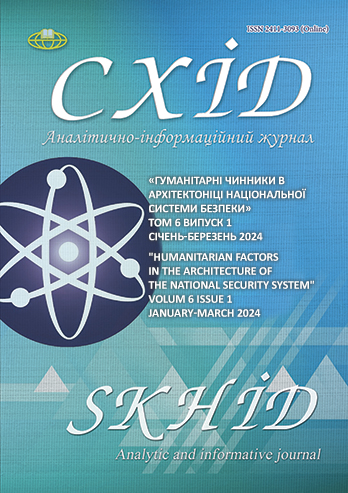Values of humanitarian security concerning institutional and public support
DOI:
https://doi.org/10.21847/2411-3093.2024.617Keywords:
humanistic values, humanitarian security, information security, media literacy, national securityAbstract
The study of humanitarian security’s value orientations is based on the results of a content analysis of the content of national documents and current publications of Ukrainian and European researchers. It was determined that the values of humanitari-an security are correlated with the general humanistic values of strategic develop-ment – intellectual freedom, justice, tolerance, people-centeredness. In the condi-tions of war, one of the key values is "security" (informational, national, personal). From the point of view of national security, the importance of the Strategy’s imple-mentation for Popularization of the Ukrainian Language until 2030 "A Strong Lan-guage – a Successful State" and the Strategy for the Development of Reading for the period until 2032 "Reading as a Life Strategy" was noted. The formation, devel-opment and ability to practically apply critical thinking and media literacy were noted as influential factors for ensuring the humanitarian security of the individual as a result of the civic education development. Special attention is paid to the spectrum of existential problems of humanitarian security, which the author highlights in the context of the study "Psychological well-being in Europe after the outbreak of war in Ukraine", carried out by a research group from many European universities. The re-sults of this study were published in the journal Nature Communications in early 2024.
Downloads
References
Bayun, M. I. (2018). Humanitarna skladova polityky derzhavnoyi bezpeky: ponyattya, pryntsypy [The humanitarian component of state security policy: concepts, principles]. Universytetski naukovi zapysky, 65, 186-199 (In Ukrainian).
Berezovska-Chmil, O. (2021). Informatsiyna bezpeka yak skladova sotsialʹnoyi stabilʹnosti derzhavy [Information security as a component of the social stability of the state]. Social and humanitarian bulletin, 37 (In Ukrainian).
Brovko, O. O. Kurban, O. V., Lisnevska, A. L. Et al. (2022). Informatsiyno-komunikatsiyna bezpeka: suchasni trendy [Information and communication security: modern trends]. Kyiv, Borys Grinchenko Kyiv University (In Ukrainian).
Holubovska, V. S. (2013). Informatsiyne suspilstvo: mozhlyvosti, problemy ta perspektyvy rozvytku [Information society: opportunities, problems and prospects for development]. Informatsiya i parvo, 2 (8), S. 10 (In Ukrainian).
Horban, Yu., Oliynyk, O. (2024). Mediahramotnist yak chynnyk zakhystu informatsiynoho prostoru vid vorozhoyi dezinformatsiyi v chas viyny. Ukrayinskyy informatsiynyy prostir, 13, 194-205. https://doi.org/10.31866/2616-7948.1(13).2024.3008-96 (In Ukrainian)
Information security strategy. Retrieved from https://zakon.rada.gov.ua/laws/show/685/2021#n7 (In Ukrainian).
Kravchenko, S., Rozkolupa, N., Zdanovska, V. (2023, November, 18). Publichni biblioteky Ukrayiny v umovakh rosiysʹkoyi zbroynoyi ahresiyi (rezultaty VI etapu doslidzhennya). National Library of Ukraine named after Yaroslav the Wise. Retrieved from https://oth.nlu.org.ua/?p=8301 (In Ukrainian).
Kunanets, N., Prystay, M. (2022). Rol bibliotek u zabezpechenni informatsiynoyi bezpeky. Library Science. Record Studies. Informology. 4, 5-10. https://doi.org/10.32461/2409-9805.4.2022.269765 (In Ukrainian).
National security strategy of Ukraine "Human security - country's security". Retrieved from https://zakon.rada.gov.ua/laws/show/392/2020#Text (In Ukrainian).
On the approval of the Library Development Strategy for the period until 2025 "Qualitative changes in libraries to ensure the sustainable development of Ukraine". Retrieved from https://www.kmu.gov.ua/-npas/248924865 (In Ukrainian).
Scharbert, J., Humberg, S., Kroencke, L. et al. (2024). Psychological well-being in Europe after the outbreak of war in Ukraine. Natural Communiation, 15, 1202. https://doi.org/10.1038/s41467-024-44693-6
Strategy for popularizing the Ukrainian language until 2030 "A strong language is a successful state". Retrieved from https://zakon.rada.gov.ua/laws/show/596-2019-%D1%80#Text (In Ukrainian).
Strategy for the development of reading for the period until 2032 "Reading as a life strategy". Retrieved from https://www.kmu.gov.ua/npas/pro-skhvalennia-stratehii-rozvytku-chytannia-na-period-do-2032-roku-chytannia-iak-zhyttieva-s190-303231 (In Ukrainian)..
The concept of the development of civic education in Ukraine: approved by the order of the Cabinet of Ministers of Ukraine dated October 3. 2018, №710-р. Retrieved from https://zakon.rada.gov.ua/laws/-show/710-2018-%D1%80#Text (In Ukrainian).
Ukraine-Russie: moral en conflit (2024, 27 February). ULB. Actus & Agenda. https://actus.ulb.be/fr/actus/-recherche/ukraine-russie-pays-et-moral-en-conflit (In French).
Voskoboynikova, O., Tereshchenko, N. (2021). Tsinnisni oriyentyry u stratehichnomu rozvytku bibliotek zakladiv vyshchoyi osvity [Value guidelines in the strategic development of libraries of higher education institutions]. Pytannya kulturolohiyi, 38, 39-53. https://doi.org/10.31866/2410-1311.38.2021.245578 (In Ukrainian)
Zakirova, S. (2024). Ukrainian Refugees from the War: an Analysis of Information Resources of Support. Tsentr doslidzennia socialnykh komunikatsii NBUV. https://doi.org/10.15407/np.67.054 (In Ukrainian)
Zdanovska, V. (2022). Viyna v Ukrayini: bibliotechno-informatsiynyy front. Bibliotechna planeta, 2, 5–8 (In Ukrainian).
Downloads
Published
How to Cite
Issue
Section
License
Copyright (c) 2024 Олена Григоревська

This work is licensed under a Creative Commons Attribution-NonCommercial-NoDerivatives 4.0 International License.
1. Authors bear responsibility for the accuracy of facts, quotations, numbers and names used.
2. Manuscripts are not sent back.
3. The publisher does not always agree with the authors' opinion.
4. The authors reserve the right to authorship of the work and pass the first publication right of this work to the journal under the terms of a Creative Commons Attribution-NonCommercial-NoDerivatives 4.0 International License. This license allows others to distribute (copy) the published work for non-commercial purposes, provided there is mandatory attribution to its authors and a link to the first publication in our journal.
5. The authors have the right to conclude separate supplement agreements that relate to non-exclusive work distribution in the form in which it has been published by the journal (for example, to upload the work to the online storage of the journal or publish it as part of a monograph), provided that the reference to the first publication of the work in this journal is included.

